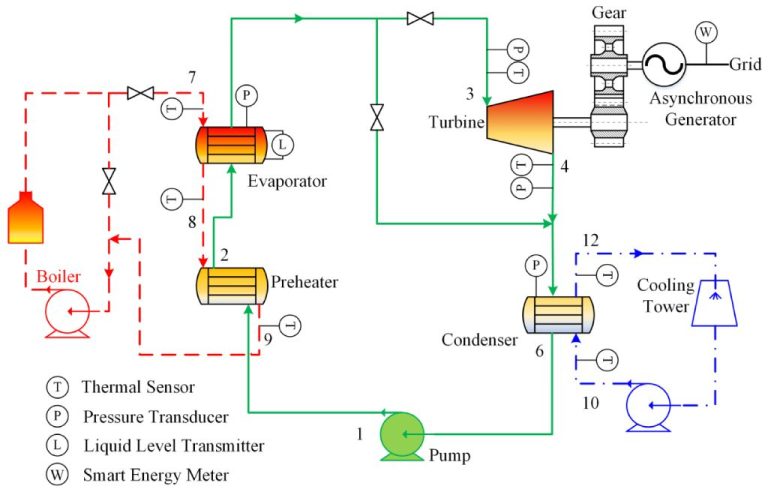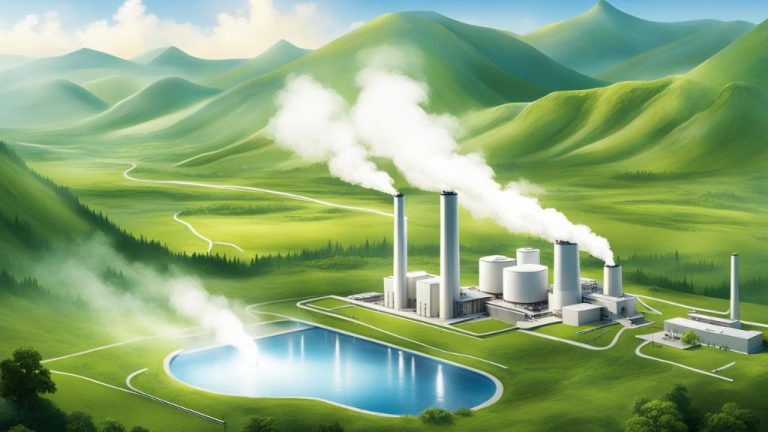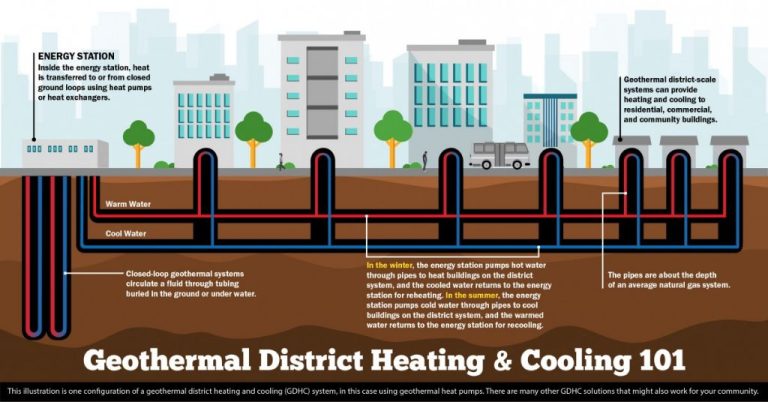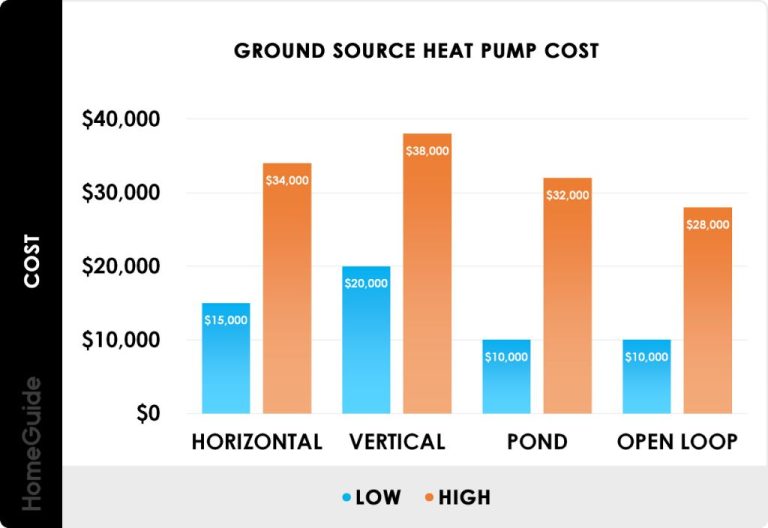Is Geothermal Better Than A Heat Pump?
Introducing Geothermal and Heat Pumps
Geothermal heating and cooling systems utilize the constant temperatures just below the earth’s surface to provide heating, air conditioning, and hot water. A network of underground pipes called a loop is buried on your property. The pipes contain a water and antifreeze solution that absorbs and carries heat between your home and the ground.
In winter, the fluid collects heat from the earth and carries it through the system to warm your home. The process reverses in summer—the liquid absorbs heat from your home and transfers it to the cooler earth. The geothermal system uses a heat pump to concentrate the earth’s energy.
Heat pumps work like refrigerators in reverse, using compression and expansion of a gas to absorb or release heat. An indoor unit with a fan blows air across a coil containing refrigerant. The refrigerant absorbs heat from indoors and pumps it to the compressor and heat exchanger in the outdoor unit. There, the heat gets transferred to another liquid and concentrated.
The superheated liquid then gets pumped through underground pipes, releasing its heat into the earth in the summer. In the winter, the liquid absorbs heat from the earth and returns to the heat pump to warm your home.
Upfront Costs
The upfront cost is often the biggest factor when deciding between a geothermal heat pump and a standard heat pump. Geothermal heat pumps require substantial installation costs since pipes need to be buried deep underground. According to Modernize, installing a geothermal heat pump for a 2,000 sq ft home costs $15,000 to $38,000. On the other hand, a standard air-source heat pump only costs $5,000 to $10,000 to install. The geology and soil conditions of the land as well as the sizing and complexity of the system determine the final installation cost. While geothermal heat pumps have higher upfront costs, they often make up for it with much lower operating costs.
Operating Costs
When considering the overall costs of geothermal vs heat pumps, it’s important to look at the operating and maintenance costs over their lifespan. According to the US Environmental Protection Agency, “geothermal heat pumps are the most energy-efficient, environmentally clean, and cost-effective systems for temperature control” source. They estimate that geothermal heat pump systems generally consume 25% to 60% less electricity than conventional heating and cooling systems. A case study by GeoComfort found that the annual operating cost for geothermal in heating mode was $107, compared to $225 for an equivalent air-to-air heat pump source. The reduced operating costs are largely due to the constant ground temperature, resulting in much higher efficiency for geothermal systems.
Efficiency
When comparing the efficiency of geothermal heat pumps and air source heat pumps, geothermal systems tend to be more efficient overall. According to Sealed, geothermal heat pumps can be 25-50% more efficient than air source heat pumps. This is because geothermal systems use the stable temperatures of the earth, which range from 45-75°F depending on location and depth. In contrast, air source heat pumps rely on the variable outdoor air temperature. The warmer the temperature difference, the more efficient the system. Since ground temperatures are more constant than air temperatures, geothermal systems maintain higher efficiencies.
Specifically, geothermal heat pumps can achieve COPs (coefficients of performance) above 3.5, meaning for every 1 unit of energy used to power the system, over 3.5 units are supplied as heat. Air source heat pumps average COPs around 2.5-3 in warm climates and 1.5-2 in colder climates (Dandelion Energy). This demonstrates how geothermal efficiency is less tied to climate than air source heat pumps. Overall, the performance and efficiency of a geothermal system will surpass an equivalently sized air source heat pump in most cases.
Environmental Impact
When comparing the environmental impact of geothermal vs heat pumps, geothermal comes out ahead. According to Dandelion Energy, geothermal heating and cooling produces 75% to 85% less carbon dioxide emissions than gas and oil heating. The U.S. Energy Information Administration also notes that direct-use geothermal applications and geothermal heat pumps have an overwhelmingly positive effect on the environment with almost no negative impacts.
In contrast, while heat pumps are more efficient than furnaces, they still rely on electricity often generated from fossil fuels. This gives geothermal a clear advantage in terms of carbon footprint and overall environmental impact.
Zoning and Controls
Geothermal systems have an advantage in their ability to control multiple temperature zones, according to Smith Sustainable Design. With a zoning system, you can control each zone’s conditions by using an individual thermostat. You can easily adjust the temperature settings for different areas of your home.
In contrast, zoning can be more challenging with some heat pump systems, especially ductless mini-split heat pumps, according to Sealed. Ductless mini-splits have an outdoor compressor connected to multiple indoor air handler units, with each indoor unit controlling a single zone. Adding zoning requires installing multiple outdoor compressors or advanced controls.
Overall, geothermal systems offer greater flexibility and ease in controlling temperatures across multiple zones, which can improve comfort and efficiency in larger homes. Heat pumps may require more equipment or complicated controls to achieve similar zoning capabilities.
Durability and Lifespan
When comparing the durability and lifespan of geothermal heat pumps and air-source heat pumps, geothermal systems tend to have a significant advantage. The underground loop portion of a geothermal system can last for 50 years or more with little to no maintenance required. The heat pump unit itself typically lasts 15-25 years for geothermal systems. In contrast, the average lifespan of an air-source heat pump is only 15-20 years for the entire system before it needs replacing.
Geothermal systems have very few moving parts underground in the loop system. This results in minimal wear and tear and reduces the need for repairs over time. Air-source heat pumps have more complexity with mechanical parts and compressors located outside that are exposed to the elements. This can lead to more frequent repairs and shorter overall lifespan.
Additionally, geothermal systems are not subjected to extreme temperature fluctuations like air-source pumps. The ground maintains a relatively stable temperature year-round, putting less strain on geothermal heat pumps. This avoids efficiency losses and component failures from extreme cold in winter or heat in summer.
Overall, geothermal systems are clear winners when it comes to durability and lifespan. The long-lasting loop system paired with the rugged heat pump unit gives geothermal technology lasting power that far exceeds the average air-source heat pump.
Home Resale Value
Both geothermal systems and heat pumps can potentially increase the resale value of a home if marketed properly when it comes time to sell. However, geothermal systems often provide a greater boost. According to real estate agents and appraisers, homes with geothermal systems tend to sell for 3-4% more than comparable homes without them.
There are several reasons geothermal systems add more resale value:
- They are visually appealing, with no outdoor condenser unit or large ductwork.
- They demonstrate an owner’s commitment to environmental sustainability and energy efficiency.
- They offer huge cost savings on utilities even after being installed for many years.
- They require less maintenance than traditional HVAC systems.
While heat pumps can also increase resale value, the boost is generally smaller at around 1-2%. Heat pumps do not provide the same visual appeal and lack some of the cost and efficiency advantages over the long run that geothermal systems deliver.
Ideal Locations
When choosing between a geothermal system and an air source heat pump, it’s important to consider your climate and geography. According to Sealed.com, geothermal systems tend to be more efficient and cost-effective in locations with extreme winters and summers. This is because ground temperatures below the frost line remain relatively constant year-round, allowing a geothermal system to operate more efficiently.
In contrast, air source heat pumps work best in mild to moderate climates without extreme seasonal variations. Their efficiency can decrease dramatically when outdoor air temperatures fall below freezing. This makes geothermal systems better suited for colder northern climates with harsh winters.
Additionally, geothermal systems require sufficient land to drill wells for the ground loop piping. This makes them better suited for rural or suburban areas with large properties. Air source heat pumps only require an outdoor unit and are therefore more feasible for urban homes and apartments with limited outdoor space.
According to BlocPower.io, in most cities, air source heat pumps tend to be the better choice given their lower upfront cost and smaller footprint. However, for homes with ample outdoor space in cold climate regions, geothermal systems can provide better performance and savings in the long run.
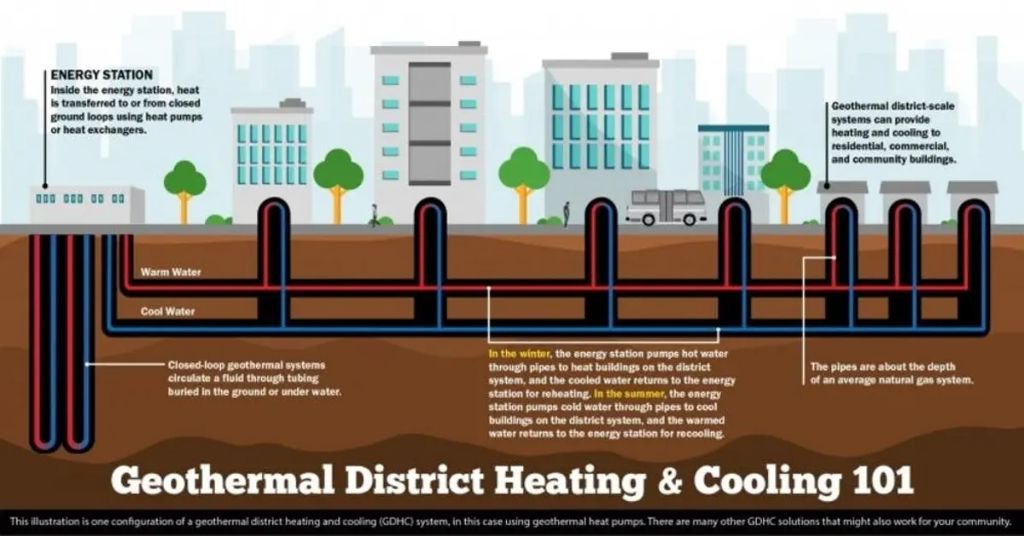
Final Verdict
When considering whether to install a geothermal system or a heat pump, the final verdict comes down to weighing the key factors of upfront costs, operating costs, efficiency, environmental impact, zoning requirements, lifespan, resale value, and ideal locations.
For those with the budget to handle the higher initial installation price, geothermal systems often make more financial sense long-term thanks to lower operating costs. They are also more efficient, providing about 3-4 units of energy for every 1 unit used to power the system. This translates into lower utility bills.
Both geothermal systems and heat pumps are eco-friendly options that reduce your home’s carbon footprint versus traditional HVAC systems. However, geothermal edges out heat pumps when it comes to sustainability.
While permitting and digging requirements can be obstacles for geothermal in certain areas, heat pumps come with fewer zoning restrictions. And heat pumps tend to have a shorter lifespan of 10-15 years versus 25+ years for geothermal.
In terms of ideal locations, geothermal works best for those with ample outdoor space for drilling, in temperate climates without extreme highs or lows, and in heating-dominated climates where it can provide more savings versus cooling. Heat pumps are better suited for homes without space to drill, in more extreme climates, and for those who need more cooling.
Overall, for homeowners who can afford the upfront investment and have the right conditions, geothermal systems are typically the better choice over heat pumps due to lower long-term costs, greater efficiency, and more sustainability. But heat pumps can be a good alternative, especially when budget or lot size are limiting factors.


